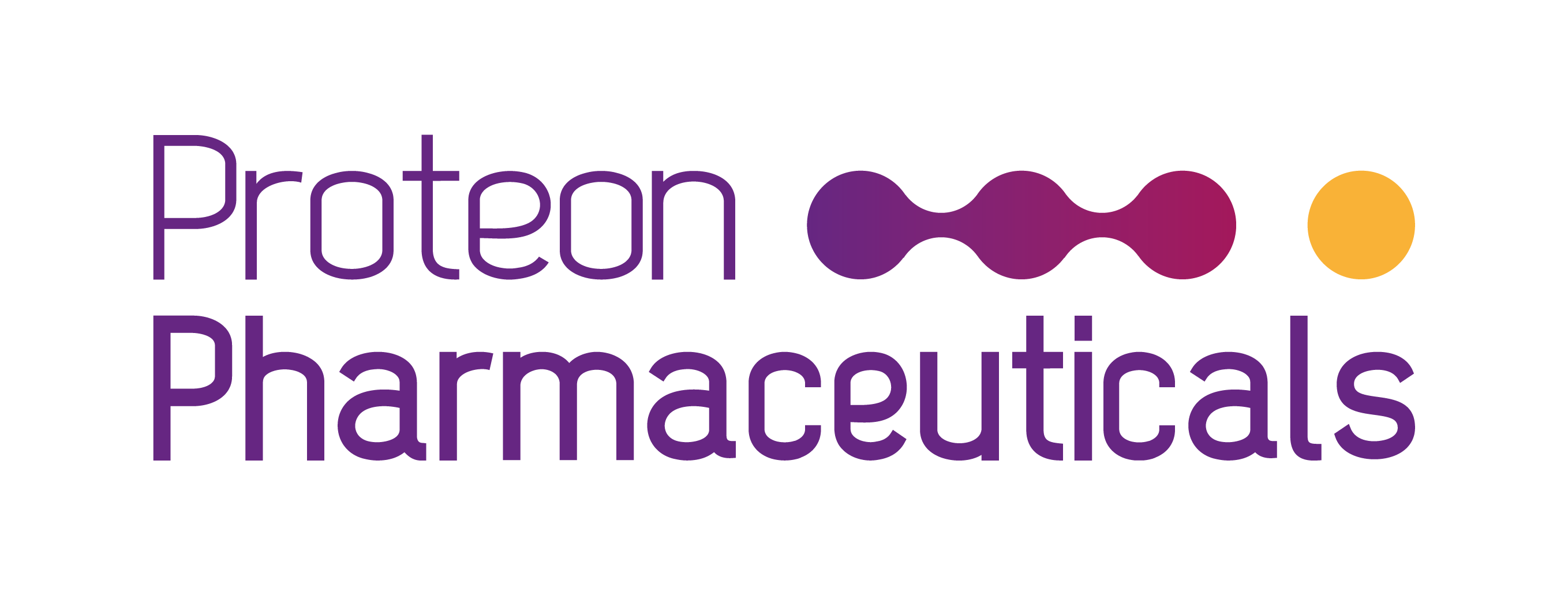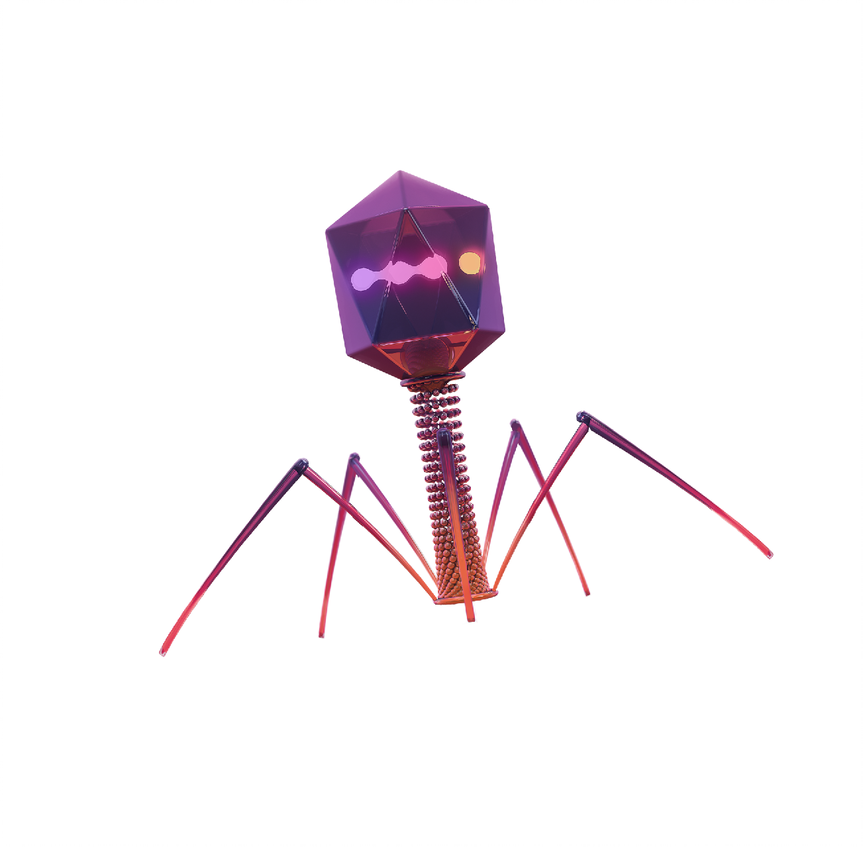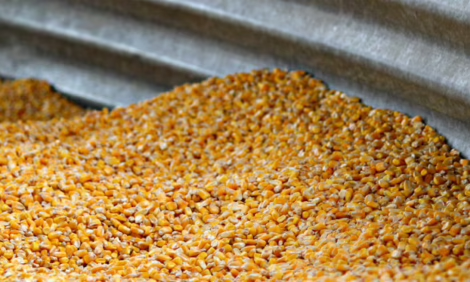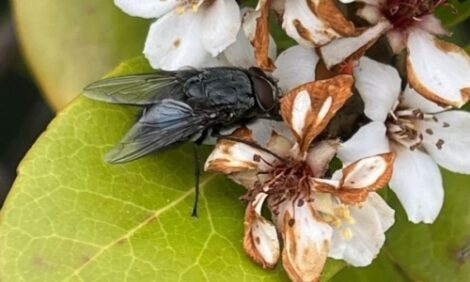



Bacteriophage treatment confirmed as safe alternative to antibiotics
BAFASAL safety confirmed by EFSAThe excessive use of antibiotics in the food industry has led to the increase of the number of multidrug resistant strains of bacteria. Regulatory agencies and governments are now restricting their use which is leading to the urgent search for alternatives to secure food chain. Bacteriophages, viruses that infect and kill bacteria, are currently being investigated and used as replacement treatments and prophylactics due to their specificity and efficacy. As they are natural components of the ecosystem they are generally regarded as safe alternatives to antibiotics. However, when specifically used in the industry, they can also make their way into humans through our food chain or exposure, as is the case for antibiotics.
That is why, in order to confirm the safety of BAFASAL®, Proteon Pharmaceuticals have performed comprehensive studies in compliance with the Good Laboratory Practice principles and with the OECD or EFSA guidelines documenting the safety of product for the target species, consumers who ingest food products obtained from animals that have received BAFASAL® and the environment [1].
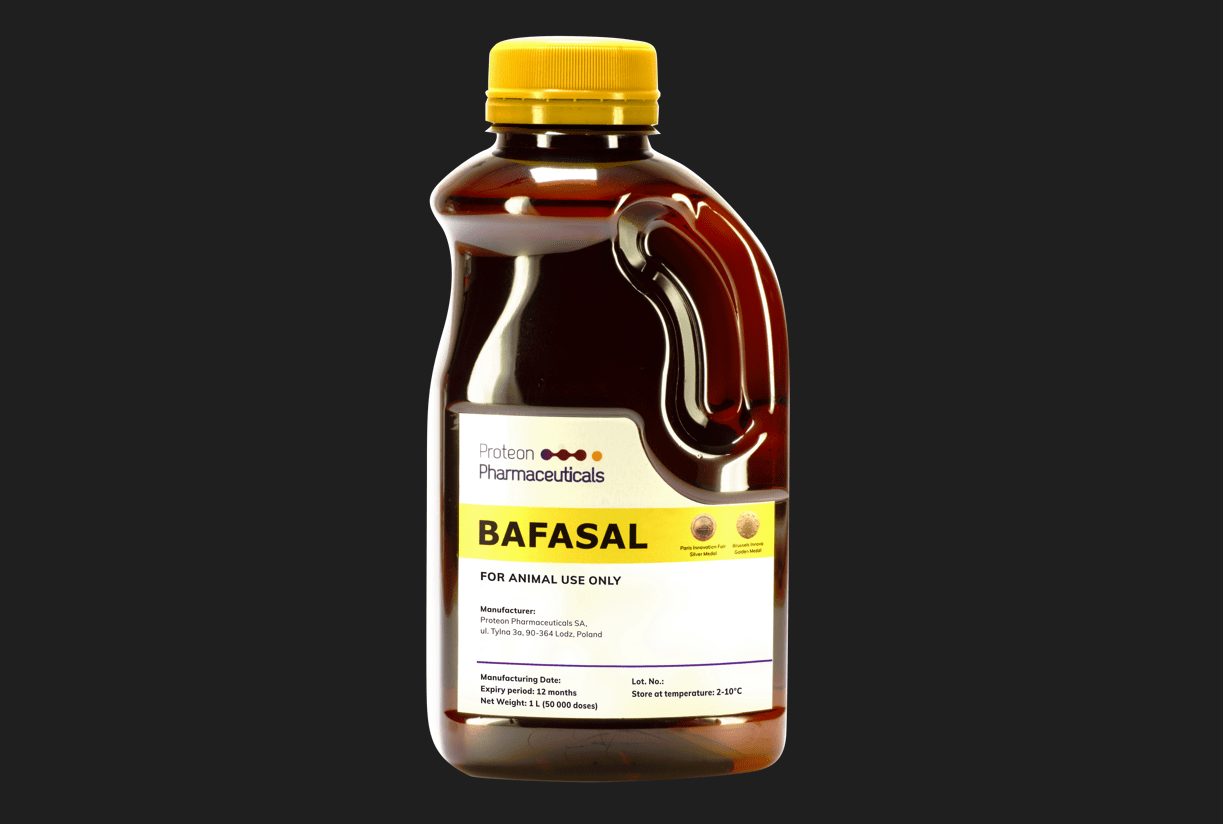
Acute oral toxicity study
Acute Oral Toxicity Study was performed to obtain information on health hazards likely to arise from a single oral exposure caused by the consumption BAFASAL®. The study was carried out on rats which were administered the preparation via metal stomach tube in four stages. For stages 1/2: 300 mg/kg of body weight (BW) was given, and for stages 3/4: 2000 mg/kg of BW was given. After administration of bacteriophages, the animals were observed for 14 days. 100% of the animals survived in the study and no signs of toxicity were observed. There were no disturbing visual changes, including any pathological changes. Body weight gain (BWG) was observed in each group [1]. As a result BAFASAL® is classified into: “category 5 or beyond classification” – according to the Globally Harmonized System (GHS) which means that substance is of relatively low acute toxicity hazard (an oral or dermal LD50 in the range of 2000-5000 mg/kg or equivalent doses for other routes).
Sub-chronic Oral Toxicity Study
This study was followed by a Sub-chronic Oral Toxicity Study to identify adverse effects that were not detected in the short-term studies. The study was conducted for 90 days on rats, which were divided into 6 groups: control group, control satellite group, satellite group, 3 groups receiving three different doses of BAFASAL® (2000 mg/kg BW, 500 mg/kg BW, and 125 mg/kg). Bacteriophages were administered once daily via stomach tube. Control group and control satellite group were fed with vehicle (ultraclean water), and satellite group were fed with BAFASAL® in a dose of 2000 mg/kg BW. Throughout the experiment, the animals were observed, and after its completion, the control and test groups underwent euthanasia and were subjected to histopathological examination. Control satellite group and satellite group were still monitored for 14 days to detect possible delayed responses. As in the previous test, no disturbing disease or toxic symptoms were observed in the animals, as well as no significant differences in BWG, behavioral, neurological, haematological or biochemical parameters were found between animals within the different groups. Likewise, no significant differences which could be attributed to the use of bacteriophages were noted in histopathological examination [1,2].
Genotoxicity Test
Another study was the Genotoxicity Test (micronucleus test - MNA) for the detection of micronuclei in the cytoplasm of interphase cells to assess the genotoxic potential. The study was conducted on CHO-K1 cell line, which were exposed to 5 concentrations of 50x concentrated BAFASAL® (0.25 μL/mL, 0.5 μL/mL, 1 μL/mL, 2 μL/mL, and 5 μL/mL) both with an exogenous metabolic activation with S9 (short treatment) and without S9 (short and extended treatment). All concentrations were not cytotoxic and did not precipitate. The study showed neither the genotoxicity of 50x concentrated BAFASAL® nor an increase in micronucleus frequency per culture under the experimental conditions [1].
Mutagenicity Assay
Another important assay was Mutagenicity Assay (Mouse Lymphoma Assay - MLA). This assay is a short-term test enabling the detection of forward gene mutations induced by mutagens in mammalian cells. The study was conducted on L5178Y TK+/– cell line, which were exposed to 4 concentrations of 50x concentrated BAFASAL® (0.5 μL/mL, 1 μL/mL, 1.5 μL/mL, and 2 μL/mL). All concentrations were not cytotoxic and did not precipitate. The assay showed no dose-related mutagenic effects between the groups, thus, confirming the non-mutagenic activity of 50x concentrated BAFASAL® [1,2].
Tolerance Study on broiler
The study was conducted for 38 days on broilers, which were divided into 4 groups: T1 - control group, and 3 groups receiving BAFASAL® (T2 - 2 x 106 PFU/bird/day (recommended dose), T3 - dose 10x, and T4 - dose 100x). We assessed body weight, average daily weight gain, average daily feed intake, water intake, hematology and biochemistry analyses of the blood, daily health records, illness, culls, and mortality. The test showed that the animals tolerated up to 100x concentrated dose without any significant differences in mortality between the groups (3-5%). In the deceased animals, the cause of death was found to be related to the gastrointestinal tract, and this was comparable between the control and test groups. There were also no significant differences in water intake. Significantly lower BW and average daily BWG in female birds from group T4 was observed after 12 days when compared to the control group. However, this effect was temporary and not observable after day 21. An increased food conversion ratio (FCR) in case of T3 and T4 female birds was also observed in the first 12 days. This effect also did not persist, with the exception of T4 birds, however, the difference was no longer statistically significant. Blood morphology and biochemistry did not reveal any significant differences that could be dependent on the dose of BAFASAL® [1,2].
Considering the results of toxicological and tolerance studies, it can be concluded that BAFASAL® is safe for poultry, consumers of derived poultry products, and does not pose
a risk to the environment.
| References | ||||
|---|---|---|---|---|
| Wójcik EA, Stańczyk M, Wojtasik A, Kowalska JD, Nowakowska M, Łukasiak M, Bartnicka M, Kazimierczak J, Dastych J. | ||||
| (2020) | Comprehensive Evaluation of the Safety and Efficacy of BAFASAL® Bacteriophage Preparation for the Reduction of Salmonella in the Food Chain.. Viruses | 12(7):742. | ||
| Bampidis V, Azimonti G, Bastos ML, Christensen H, Dusemund B, Kouba M, Durjava MF, López-Alonso M, López Puente S, Marcon F, Mayo B, Pechová A, Petkova M, Ramos F, Sanz Y, Villa RE, Woutersen R, Cocconcelli PS, Glandorf B, Herman L, Prieto Maradona M, Saarela M, Dierick N, Martelli G, Brantom P, Tosti L, Svensson K, Anguita M, Galobart J, Innocenti M, Pettenati E, Revez J, Brozzi R. | ||||
| (2021) | Safety and efficacy of a feed additive consisting on the bacteriophages PCM F/00069, PCM F/00070, PCM F/00071 and PCM F/00097 infecting Salmonella Gallinarum B/00111 (Bafasal®) for all avian species (Proteon Pharmaceuticals S.A.). | 19(5):e06534. | EFSA Panel on Additives and Products or Substances used in Animal Feed (FEEDAP), |








